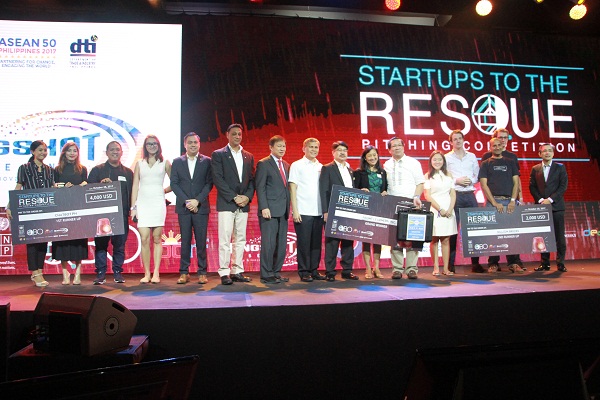Local education technology startup Frontlearners Inc. emerged as the winner at STARTUPS TO THE RESQUE during the Slingshot ASEAN 2017 where 20 out of 140 entries of the different startups from Southeast Asia participated in a pitch battle centered around disaster preparedness and resilient recovery.
Hailed as top seed, Frontlearners provides students with an e-learning tool that integrates disaster preparedness content into its curriculum. The device works with or without Internet, is ready-to-use, solar powered, and provides centralized information on how to prepare, respond, and recover
from a given disaster. The innovative learning tool won the team US$10,000.
With almost 20 years of experience in eLearning, power duo Leo and Elaine de Velez established Frontlearners as an eTeaching content and solution provider that helps boost student competency and increase enrollment of K-12 schools. “We believe that quality education can change lives and open up opportunities. Frontlearners becomes an avenue to trail blaze social innovation in the Philippine Education Technology arena,” said Leo de Velez.
The pitch competition was organized by QBO Innovation Hub (QBO), the country’s first public-private initiative for startups and was formed through the partnership of renowned private companies and government institutions including IdeaSpace, J.P. Morgan, the Department of Science and Technology (DOST), and the Department of Trade and Industry (DTI).

With great hope anchored in the capabilities of today’s youth, Philippine Disaster Resilience Foundation (PDRF) and QBO President Butch Meily underscores the importance of bringing in new ideas when it comes to disaster preparedness and resilience within the digital age.
“We challenge start-ups to come up with noble ideas and solutions in various aspects of humanity,” Meily said. “Through this, we create a community that aims to make a difference in the lives of the Filipinos, especially those in the far-flung and disaster stricken areas.”
In line with its vision of forwarding the Philippine startup ecosystem, QBO, in partnership with the United Nations Development Programme (UNDP) and the PDRF, came up with STARTUPS TO THE RESQUE as a way to promote the startup’s role in national development as well as encourage new ideas that will strengthen the country’s preparedness and resilience in the face of a
disaster.
Philippine-based startup, ChatboxPH, won first runner up and USD 4,000 for their idea of using Chatbots to disseminate relevant information and reminders to people in times of emergencies. Singapore-based startup, billionBricks, won second runner up and USD 2,000 for their idea of
providing shelter kits to homeless or displaced peoples.
Initiatives for nation development
The pitch competition culminated at DTI’s Slingshot ASEAN 2017 where the top 20 startups exhibited their best ideas to a panel of mentors, investors, and industry experts.
DTI Undersecretary for Trade and Investments Promotion Group Nora K. Terrado, who also serves as the ASEAN Committee on Business and Investment Promotion Chairman, emphasizes the important of the Slingshot ASEAN 2017 primarily as an avenue for the startup community to thrive.
“Slingshot brings about a new breed of businesses that are innovative, particularly by the startup ecosystem,” Terrado said. “We are encouraging the growth of start-ups in the country as part of the government’s efforts in boosting the economy and creating jobs for Filipinos in the country.”
ASEAN startups
Other than the top 3 winners, the Top 20 Finalists for the startup competition came from many different backgrounds and industries. There were hardware-based startups like SkyEye Analytics, a drone startup doing land surveying, disaster mitigation, precision agriculture, and forest protection; Haraya Labs, a company teaching STEM education to K-12 students using virtual reality.
There were also crowdfunding startups like GavaGives, a fundraising platform for non-profit organizations; Cropital, a crowdfunding platform to help finance farmers.
Lifestyle-based startups also made the cut, like Tralulu, a digital marketplace for travelers and local guides; StyleGenie PH, a startup offering styling subscription box in the Philippines; Pushkart.ph, an online grocery delivery service.
There were startups that specialized in software, LifeMesh, a software that uses blockchain to connect humanitarian organizations to communities and to foster transparency and accountability; Ascendant Technologies, a software development company specializing in healthcare digital systems management.
Service-based startups also contributed their ideas, like Blogapalooza, a startup that connects businesses to bloggers and influencers;
There is also Senti, social media analytics startup focusing on understanding Filipino culture; ServeHappy Jobs, an online job marketplace for food service professionals.
There were social enterprises that participated, like UPROOT Aquaponics, an aquaponics enterprise that aims to alleviate hunger, poverty, and malnutrition; Go Gridless, a B2B wholesaler of off-grid technology solutions; and Unomap, a digital identity solution provider that digitize individual identities into a decentralized model.
And lastly, there were also non-Filipino startups, like After Effect, a Thailand-based startup specializing in artificial intelligence; Timba, an Indonesian social enterprise that promote sustainable living.

